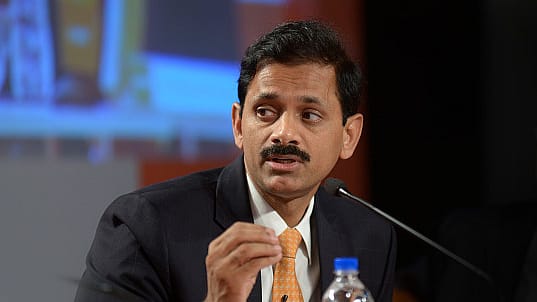V. Vaidyanathan spills the beans on how IDFC First Bank’s digital-first approach is changing modern banking
ADVERTISEMENT

Technology is no longer just a differentiator—it’s become the foundation of modern banking. V. Vaidyanathan, MD & CEO of IDFC First Bank, shared insights on how digital infrastructure is shaping the future of banking and how the bank's digital-first approach has positioned it as a startup-friendly financial institution, in a fireside chat with Siddarth Pai, founding partner & CFO at 3one4 Capital at the 2nd edition of Startup Mahakumbh.
“The way we think about it is that we find technology both as a means of providing outstanding service and as a tool to offer solutions that conventional methods cannot,” said Vaidyanathan. He highlighted how digital banking has enabled rapid scaling, citing the growth of the bank’s FASTag issuance from one lakh to 22 million in just five years. “No traditional model can make that happen,” he added.
While many startups burn through cash on aggressive marketing, IDFC First Bank has followed a different path. Vaidyanathan emphasised that the bank’s customer acquisition strategy is built around strong products rather than heavy marketing spends. “Product, product, product. If the product is very powerful, very customer-friendly, and truly puts the customer first, it creates a natural pull,” he opined.
He argued that marketing cannot compensate for a poor user experience. “You can advertise anything you want, but if the experience layer is bad, you lose the customer,” he said. This approach has been a key factor in the bank’s ability to grow rapidly while maintaining financial prudence.
A product-first culture
For a large institution like a bank, adopting a startup-like product-first mindset requires a cultural shift. Vaidyanathan explained that since the merger in December 2018, IDFC First Bank has operated with a startup ethos, reinforced by three core principles: ethical banking, digital banking, and a commitment to building a strong technology stack.
“We drill these three principles into our team every day and put up placards everywhere to reinforce them,” he said. The bank has built a modern API-driven technology stack to enhance customer experience. “We have system APIs, service APIs, and experience APIs that connect all channels, allowing us to offer a seamless banking experience,” he explained.
This focus on technology and digital integration has also allowed the bank to work closely with regulators. When the Reserve Bank of India launched the pilot for the Central Bank Digital Currency (CBDC), IDFC First Bank was among the first participants. “A startup tremendously benefits from India's new digital ecosystem. This is a very powerful thing. And being new and being able to connect to the ecosystem has changed our life,” Vaidyanathan said.
How to scale
On broader lessons for entrepreneurs, Vaidyanathan pushed on the importance of capital and trust. “Even with a phenomenal economic model, raising adequate capital is crucial—capital is like gas in a tank,” he said. But capital alone is not enough; trust is equally critical. “When you put out your hand and say you need capital, people should be willing to give it. Trust is hard-earned but is the foundation of long-term growth,” he said.
This philosophy was central to his earlier venture, Capital First, which later merged with IDFC Bank to form IDFC First Bank. “Without capital, we couldn’t have gone far. A strong economic model, trustworthiness, and access to capital make for a powerful combination,” he concluded.